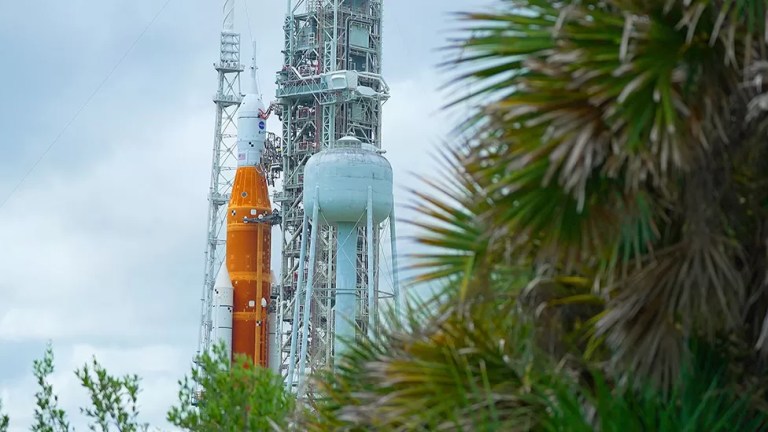Artemis Moon Rocket To Make Second Launch Attempt
The US space agency will attempt once again in the coming hours to launch its most powerful ever rocket.
Nasa was thwarted by a mix of technical and weather woes when it tried to get the Artemis I Moon mission off Earth on Monday, reports the BBC.
But the mood remains positive at Florida’s Kennedy Space Center.
“We’ve got to show up, we’ve got to be ready and we’ve got to see what the day brings,” Mike Sarafin, Nasa’s Artemis mission manager, told reporters.
Saturday’s attempt to despatch the Space Launch System (SLS) rocket has been scheduled for the start of a two-hour window that begins at 14:17 local time (19:17 BST; 18:17 GMT).
The 100m-tall vehicle’s objective will be to hurl a human-rated capsule in the direction of the Moon, something that hasn’t happened since Project Apollo ended in 1972.
Artemis I is a technology demonstration, so there will be no crew aboard on this occasion, but should everything go to plan on the mission then Artemis II, expected to fly in 2024, very definitely will be carrying humans.
Nasa astronaut Jessica Mier said everyone should therefore show some patience as the SLS moves towards its maiden flight, and to not be surprised if there is a further postponement.
“Yeah, of course it’s frustrating for everybody, but it’s not unexpected,” she told BBC News.
“It’s part of how we do things at Nasa. The SLS will eventually have humans on it, my friends, my colleagues. So, we need to make sure this test flight goes well.”
Monday’s bid to fly SLS was ultimately scrubbed because controllers couldn’t be sure the four big engines under the rocket’s core-stage were properly prepared for flight.
The shuttle-era power units are chilled during countdown to -240C to prevent them being shocked by the sudden injection of cryogenic propellants at the moment of launch. But a sensor was indicating that Engine No 3 might be 15-30 degrees short of where its temperature needed to be.
Bill Muddle from manufacturer Aerojet Rocketdyne is confident though that the sensor was faulty, and if it plays up again on Saturday it will likely just be ignored.
“Having reviewed the data and all the other indicators, Engine No 3 could even have been a little bit colder than the others on Monday,” he said.
“We now understand what we need to go look at to get comfortable to go launch.”















Post Comment